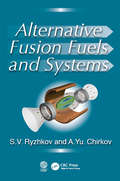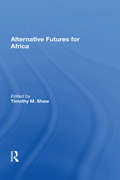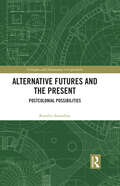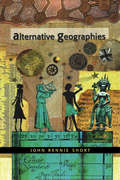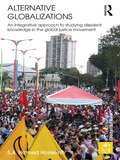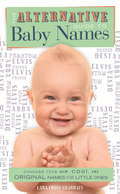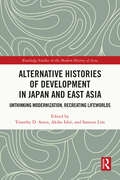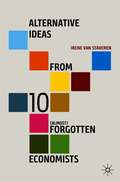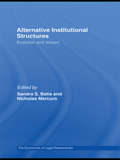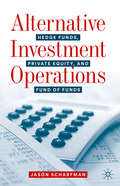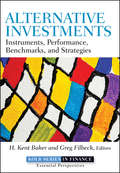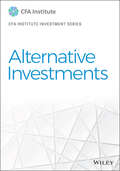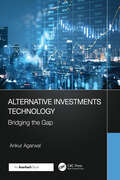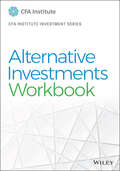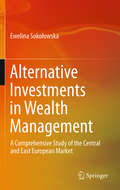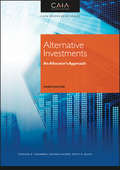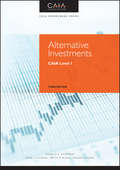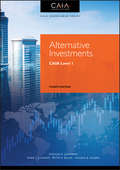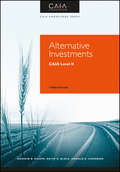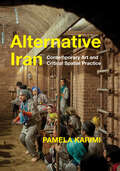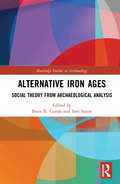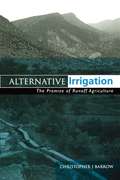- Table View
- List View
Alternative Fusion Fuels and Systems
by Sergei V. Ryzhkov Alexei Yu. ChirkovExplores the systems of magnetic confinement of high-temperature plasma with closed and open magnetic field lines which relate to alternative compact devices of controlled thermonuclear fusion. Energy balance schemes of thermonuclear plasmas and main reactor characteristics are presented as the authors compare conceptual projects based on classical tokamak and stellarator, spherical tokamak and compact torus. They explore the questions and problems of new promising nuclear and thermonuclear power plants that source thermonuclear neutrons on a mixture of deuterium and tritium, and a low-radioactive reactor on a mixture of deuterium and helium-3.
Alternative Futures For Africa
by Timothy M. ShawThis comprehensive, critical examination of Africa’s future–written by a diverse group of Africans and Africanists–raises many questions and challenges concerning the development and unity of the African continent. Eclectic in range and method, but cohesive in concern, the book identifies and analyzes alternative probabilities in the political, economic, and social spheres and on the national, regional, and international levels. Many of the contributors point toward an unpromising future for Africa unless its development strategy is changed and its inheritance of dependence on the world system overcome.
Alternative Futures and the Present: Postcolonial Possibilities (Critiques and Alternatives to Capitalism)
by Ranabir SamaddarThis book explores the idea that alternatives to our present condition are available in the present, such that a search for alternatives must involve rigorous study of some of its central texts, events, and thinkers. Through engagement with selected modern thinkers, texts, and events, it imagines a different future from the position of the current postcolonial moment, indicating the possibilities that emerge from the present and which shape contemporary radical thinking. An invitation to imagine a possible future marked with alternative possibilities of conducting struggles, and living through contentions and social restructuring, it will appeal to scholars with interests in social and political theory, political philosophy, colonialism and postcolonialism, and historical materialism.
Alternative Geographies
by John Rennie ShortAn accessible and groundbreaking text that takes a fresh view of contemporary geographical issues by looking at the geographies we have lost.Geography means writing about the world. Alternative ways of writing about the world are introduced and critically evaluated. The book discusses medieval cosmologies, Renaissance magic, feng shui, and the knowledge systems of indigenous people. Alternative Geographies provides an alternative way of looking, describing and understanding the world
Alternative Globalizations: An Integrative Approach to Studying Dissident Knowledge in the Global Justice Movement (Rethinking Globalizations)
by S. A. HosseiniAre the growing oppositions to neoliberal market globalism (especially in the aftermath of global economic meltdown) able to develop meaningful alternative ideologies? Is there any substantial alternative to the world capitalist system on the horizon? How would the ideologies and ideas address the dire dilemmas of economy vs. ecology, redistribution vs. recognition, global vs. local, reform vs. revolution etc.? This book answers such important questions by examining the intellectual structure of the so-called ‘anti-globalization’ or ‘global justice’ movement. It explores the formation and transformation of ideas, identities, and solidarities in the movement. The book also develops an analytical model to explain the movement’s ideational novelties and continuities in terms of both activist social experiences and global social changes. Hosseini develops new sociological concepts, integrates opposing theoretical perspectives into one approach, and addresses the gap between critical theories and activist practices. Through this endeavor, he discovers an emerging mode of consciousness which is characterized by its cross-identity and cross-ideological nature. This is a live but quiet global revolution. Drawing on a variety of disciplines, this gourd-breaking volume will be of interest to students and scholars of global studies, political sciences, sociology and social movement studies.
Alternative Globalizations: Eastern Europe and the Postcolonial World
by James Mark Artemy M. Kalinovsky Steffi MarungGlobalization has become synonymous with the seemingly unfettered spread of capitalist multinationals, but this focus on the West and western economies ignores the wide variety of globalizing projects that sprang up in the socialist world as a consequence of the end of the European empires. This collection is the first to explore alternative forms of globalization across the socialist world during the Cold War. Gathering the work of established and upcoming scholars of the Soviet Union, Eastern Europe, and China, Alternative Globalizations addresses the new relationships and interconnections which emerged between a decolonizing world in the postwar period and an increasingly internationalist eastern bloc after the death of Stalin. In many cases, the legacies of these former globalizing impulses from the socialist world still exist today. Divided into four sections, the works gathered examine the economic, political, developmental, and cultural aspects of this exchange. In doing so, the authors break new ground in exploring this understudied history of globalization and provide a multifaceted study of an increasing postwar interconnectedness across a socialist world.
Alternative Guide to Baby Names
by Cara Frost-SharrattGuarantee your kid stands out from the crowd with this vast selection of hip, edgy and occasionally outrageous baby names. The Alternative Guide to Baby Names goes beyond the pedestrian suggestions of the traditional baby name book, featuring boys' names like Draven, Legion, Skylar and Snake, and quirky girls' names such as Harper, Nori, Eyre and Effie. Taking inspiration from celebrities, fictional characters, the music industry and place names, this book will provide you with hundreds of ideas and hours of fun.
Alternative Histories of Development in Japan and East Asia: Unthinking Modernization, Recreating Lifeworlds (Routledge Studies in the Modern History of Asia)
by Timothy D. Amos Akiko Ishii Samson LimThis book examines the history of development in East Asia in terms of material change and human-nature relations from the perspectives of people living in Asia in modern and pre-modern periods.By challenging the reader to “unthink” what modern development is, each chapter offers a case study which discovers and reconstructs indigenous forms of knowledge and local practice related to material change. In doing so, the book illuminates the point where modern notions of development emerged and thus aids in the process of understanding how they achieved hegemonic status. This in turn expands the notion of what development can and should entail and provides valuable pathways for rethinking our relations with the social world and the environment.This book will be a valuable resource to students and scholars of Asian development, Asian history and environmental history.
Alternative Histories of English
by Peter Trudgill Richard WattsThis groundbreaking collection explores the beliefs and approaches to the history of English that do not make it into standard textbooks.Orthodox histories have presented a tunnel version of the history of the English language which is sociologically inadequate. In this book a range of leading international scholars show how this focus on standard English dialect is to the detriment of those which are non-standard or from other areas of the world. Alternative Histories of English:* reveals the range of possible 'narratives' about how different varieties of 'Englishes' may have emerged* places emphasis on pragmatic, sociolinguistic and discourse-oriented aspects of English rather than the traditional grammar, vocabulary and phonology * considers diverse topics including South African English, Indian English, Southern Hemisphere Englishes, Early Modern English, women's writing, and politeness.Presenting a fuller and richer picture of the complexity of the history of English, the contributors to Alternative Histories of English explain why English is the diverse world language it is today.
Alternative Ideas from 10 (Almost) Forgotten Economists
by Irene van StaverenHow should we address today’s big problems, and what we can take from icons of economics past? How would John Maynard Keynes have resolved today’s debt problem, or how would Adam Smith have assessed the European carbon emission trading market? This book applies the ideas of ten renowned economists (Marx, Minsky, Keynes, Knight, Bergmann, Veblen, Sen, Myrdal, Smith, Robinson) to real world economic problems, directly or indirectly related to the causes and consequences of the 2008 financial crisis. Each chapter presents an economist, and structures the ‘problem’, the ‘insight’ (the economist’s idea), the ‘economist’ (short bio), and two ‘practices’ offering real-world alternatives. This book presents a lively and original approach that will be of interest to economists and non-economists alike, discussing key elements of an economics for a postcapitalist economy and connecting policy insights to real-world problems of today.
Alternative Institutional Structures: Evolution and impact (The\economics Of Legal Relationships Ser.)
by Nicholas Mercuro Sandra S. BatieIn the spring on 2006, a workshop was held at Michigan State University to honour the career of A. Allan Schmid and his writings about how institutions evolve and how alternative institutions, including property rights, shape political relationships and impact economic performance. This edited book is the outcome of the workshop. It is a collection
Alternative Investment Operations: Hedge Funds, Private Equity, and Fund of Funds
by Jason ScharfmanAlternative investments such as hedge funds, private equity, and fund of funds continue to be of strong interest among the investment community. As these investment strategies have become increasingly complex, fund managers have continued to devote more time and resources towards developing best practice operations to support the actual trade processing, fund accounting, and back-office mechanics that allow these strategies to function. Representative of this operational growth, estimates have indicated that fund managers have seen increased operating budgets of 30% or more in recent years.In today’s highly regulated environment, alternative investment managers have also increasingly had to integrate rigorous compliance and cybersecurity oversight into fund operations. Additionally, with recent advances in artificial intelligence and big data analysis, fund managers are devoting larger portions of their information technology budgets towards realizing technology-based operational efficiencies. Alternative investment fund service providers have also substantially increased their scope and breadth of their operations-related services. Furthermore, investors are increasingly performing deep-dive due diligence on fund manager operations at both fund level and management company levels.This book provides current and practical guidance on the foundations of how alternative investment managers build and manage their operations. While other publications have focused on generalized overviews of historical trading procedures across multiple asset classes, and the technical intricacies of specific legacy operational procedures, Alternative Investment Operations will be the first book to focus on explaining up-to-date information on the specific real-world operational practices actually employed by alternative investment managers. This book will focus on how to actually establish and manage fund operations. Alternative Investment Operations will be an invaluable up-to-date resource for fund managers and their operations personnel as well as investors and service providers on the implementation and management of best practice operations.
Alternative Investments
by H. Kent Baker Greg FilbeckA comprehensive guide to alternative investments that reveals today's latest research and strategiesHistorically low interest rates and bear markets in world stock markets have generated intense interest in alternative investments. With returns in traditional investment vehicles relatively low, many professional investors view alternative investments as a means of meeting their return objectives. Alternative Investments: Instruments, Performance, Benchmarks, and Strategies, can put you in a better position to achieve this difficult goal.Part of the Robert W. Kolb Series in Finance, Alternative Investments provides an in-depth discussion of the historic performance, benchmarks, and strategies of every major alternative investment market. With contributions from professionals and academics around the world, it offers valuable insights on the latest trends, research, and thinking in each major area. Empirical evidence about each type of alternative investment is featured, with research presented in a straightforward manner.Examines a variety of major alternative asset classes, from real estate, private equity, and commodities to managed futures, hedge funds, and distressed securitiesProvides detailed insights on the latest research and strategies, and offers a thorough explanation of historical performance, benchmarks, and other critical informationBlends knowledge from the conceptual world of scholars with the pragmatic view of practitioners in this fieldAlternative investments provide a means of diversification, risk control, and return enhancement and, as such, are attractive to many professional investors. If you're looking for an effective way to hone your skills in this dynamic area of finance, look no further than this book.
Alternative Investments (CFA Institute Investment Series)
by CFA InstituteThe complete guide to alternative investments, from experts working with CFA Institute Alternative Investments is the definitive guide to understanding non-traditional asset classes. Alternatives are a disparate group of investments that are distinguished from long-only, publicly traded investments in stocks, bonds, and cash (often referred to as traditional investments). Alternative investments include real estate, commodities, infrastructure, and other non-traditional investments such as private equity or debt and hedge funds. They are attractive to investors because of the potential for portfolio diversification resulting in a higher risk-adjusted return for the portfolio. Alternative Investments and its accompanying workbook (sold separately) lead students and investment professionals through the many characteristics of non-traditional assets, including: Narrow specialization of the investment managers Relatively low correlation of returns with those of traditional investments Less regulation and less transparency than traditional investments Limited historical risk and return data Unique legal and tax considerations Higher fees, often including performance or incentive fees Concentrated portfolios Restrictions on redemptions (i.e. “lockups” and “gates”) CFA Institute is the world's premier association for investment professionals, and the governing body for the CFA® Program, CIPM® Program, CFA Institute ESG Investing Certificate, and Investment Foundations® Program. Those seeking a deeper understanding of the markets, mechanisms, and use of alternatives will value the level of expertise CFA Institute brings to the discussion, providing a clear, comprehensive resource for students and professionals alike. Whether used alone or in conjunction with the companion workbook, Alternative Investments offers a complete course in alternative investments and their role in investment management.
Alternative Investments Technology: Bridging the Gap
by Ankur AgarwalThe alternative investments technology market is still considered young and highly diverse, driving varied technology needs. Few players can address the needs of the entire market, while new specialized providers continue to emerge, making choices even more complex. Investors now demand more rigorous due diligence, greater access to senior management, and more detailed, frequent data reports before committing to funds. In response, firms must be agile, ready to reassess, and revamp their operations and practices.Alternative Investments Technology: Bridging the Gap is tailored for investment professionals, managers, and technologists navigating this evolving landscape. It explores how technology enhances management and investment processes, helping firms maintain competitive advantage and operational efficiency. The book provides insights into leveraging technology for better decision-making, improved efficiency, and enhanced investor outcomes. As technology integration in alternative investments evolves, staying informed is essential. This book serves as an indispensable guide to thriving in this dynamic environment.
Alternative Investments Workbook (CFA Institute Investment Series)
by CFA InstituteHands-on practice with alternative investments based on real-world scenarios Alternative Investments Workbook provides the key component of effective learning—practice. Designed for both students and investment professionals, this companion workbook conveniently aligns with the Alternative Investments text chapter-by-chapter, offers brief chapter summaries to refresh your memory on key points before you begin working, and explicitly lays out the learning objectives so you understand the “why” of each problem. This workbook helps you: Synthesize essential material from the Alternative Investments text using real-world applications Understand the key characteristics of non-traditional investments Work toward specific chapter objectives to internalize important information CFA Institute is the world's premier association for investment professionals, and the governing body for the CFA® Program, CIPM® Program, CFA Institute ESG Investing Certificate, and Investment Foundations® Program. Those seeking a deeper understanding of the markets, mechanisms, and use of alternatives will value the level of expertise CFA Institute brings to the discussion as well as the extra practice delivered in Alternative Investments Workbook based on real scenarios investors face every day.
Alternative Investments in Wealth Management: A Comprehensive Study of the Central and East European Market
by Ewelina SokołowskaThis monograph provides a comprehensive source of analysis and research on alternative investments in the wealth management process, with a special focus on Poland and Eastern Europe. It presents the characteristics that distinguish alternative investments from traditional investments and illustrates the benefits and risks involved in the former. The experience gained in developed countries is extremely valuable for the analysis of both the Polish and Eastern European financial markets. In the theoretical part of the book, key aspects of alternative investments are collected, systematized and developed; subsequently, in the empirical part the results of selected studies on the alternative investment sector around the world are examined. Lastly, the book's findings are applied to the context of alternative financial investments in Poland, investigating the preferences for alternative investments in the country, which is the largest market in Central and Eastern Europe. Not only of theoretical interest, these insights have a high application value, making the book an essential resource for scholars, practitioners and policymakers alike.
Alternative Investments: An Allocator's Approach (Wiley Finance Ser.)
by CAIA Association Keith H. Black Donald R. Chambers Hossein B. KazemiWhether you are a seasoned professional looking to explore new areas within the alternative investment arena or a new industry participant seeking to establish a solid understanding of alternative investments, Alternative Investments: An Allocator's Approach, Fourth Edition (CAIA Level II curriculum official text) is the best way to achieve these goals. In recent years, capital formation has shifted dramatically away from public markets as issuers pursue better financial and value alignment with ownership, less onerous and expensive regulatory requirements, market and information dislocation, and liberation from the short-term challenges that undergird the public capital markets. The careful and informed use of alternative investments in a diversified portfolio can reduce risk, lower volatility, and improve returns over the long-term, enhancing investors' ability to meet their investment outcomes. Alternative Investments: An Allocator's Approach (CAIA Level II curriculum official text) is a key resource that can be used to improve the sophistication of asset owners and those who work with them. This text comprises the curriculum, when combined with supplemental materials available at caia.org, for the CAIA Level II exam. "Over the course of my long career one tenet has held true, 'Continuing Education'. Since CalSTRS is a teachers' pension plan, it is no surprise that continuing education is a core attribute of our Investment Office culture. Overseeing one of the largest institutional pools of capital in the world requires a cohesive knowledge and understanding of both public and private market investments and strategies. We must understand how these opportunities might contribute to delivering on investment outcomes for our beneficiaries. Alternative Investments: An Allocator's Approach is the definitive core instruction manual for an institutional investor, and it puts you in the captain's chair of the asset owner."—Christopher J. Ailman, Chief Investment Officer, California State Teachers’ Retirement System "Given their diversified cash flow streams and returns, private markets continue to be a growing fixture of patient, long-term portfolios. As such, the need to have proficiency across these sophisticated strategies, asset classes, and instruments is critical for today's capital allocator. As a proud CAIA charterholder, I have seen the practical benefits in building a strong private markets foundation, allowing me to better assist my clients."—Jayne Bok, CAIA, CFA, Head of Investments, Asia, Willis Tower Watson
Alternative Investments: CAIA Level I (Wiley Finance)
by CAIA Association Mark J. Anson Hossein Kazemi Keith H. Black Donald R. ChambersThe official CAIA Level 1 curriculum bookAlternative Investments: CAIA Level I, 3rd Edition is the curriculum book for the Chartered Alternative Investment Analyst (CAIA) Level I professional examination. Covering the fundamentals of the alternative investment space, this book helps you build a foundation in alternative investment markets. You'll look closely at the different types of hedge fund strategies and the range of statistics used to define investment performance as you gain a deep familiarity with alternative investment terms and develop the computational ability to solve investment problems. From strategy characteristics to portfolio management strategies, this book contains the core material you will need to succeed on the CAIA Level I exam. This updated third edition tracks to the latest version of the exam, and is accompanied by the following ancillaries: a workbook, study guide, learning objectives, and an ethics handbook. Most investment analyst education programs focus primarily on the traditional asset classes, pushing alternative investments to the sidelines. The CAIA designation was developed in response to the tremendous growth of alternative investing, and is the industry's premier educational standard. This book is your official study companion, bringing you fully up to speed on everything you need to know (with the exception of the ethics material covered in a separate handbook). Understand the complexities of each alternative asset class Learn the quantitative techniques professionals use every day Dig into the unique aspects of alternative investments Master the core material covered by the CAIA Level I exam More than 300 financial institutions and hedge funds have committed key executives to the CAIA exam, and this rapidly growing trend speaks to the designation's rising status as a must-have credential for anyone in the alternative investment sphere. Increase your chances of success by getting your information straight from the source in CAIA Level I.
Alternative Investments: CAIA Level I (Wiley Finance)
by CAIA Association Mark J. Anson Keith H. Black Donald R. Chambers Hossein B. KazemiAlternative Investments: CAIA Level I, 4th Edition is the curriculum book for the Chartered Alternative Investment Analyst (CAIA) Level I professional examination. Covering the fundamentals of the alternative investment space, this book helps you build a foundation in alternative investment markets. You'll look closely at the different types of hedge fund strategies and the range of statistics used to define investment performance as you gain a deep familiarity with alternative investment terms and develop the computational ability to solve investment problems. From strategy characteristics to portfolio management strategies, this book contains the core material you will need to succeed on the CAIA Level I exam. This updated fourth edition tracks to the latest version of the exam and is accompanied by the following ancillaries: a workbook, study guide, learning objectives, and an ethics handbook.
Alternative Investments: CAIA Level II
by CAIA Association Hossein Kazemi Keith H. Black Donald R. ChambersIn-depth Level II exam preparation direct from the CAIA Association CAIA Level II is the official study guide for the Chartered Alternative Investment Analyst professional examination, and an authoritative guide to working in the alternative investment sphere. Written by the makers of the exam, this book provides in-depth guidance through the entire exam agenda; the Level II strategies are the same as Level I, but this time you'll review them through the lens of risk management and portfolio optimisation. Topics include asset allocation and portfolio oversight, style analysis, risk management, alternative asset securitisation, secondary market creation, performance and style attribution and indexing and benchmarking, with clear organisation and a logical progression that allows you to customise your preparation focus. This new third edition has been updated to align with the latest exam, and to reflect the current practices in the field. The CAIA designation was developed to provide a standardized knowledge base in the midst of explosive capital inflow into alternative investments. This book provides a single-source repository of that essential information, tailored to those preparing for the Level II exam. Measure, monitor and manage funds from a risk management perspective Delve into advanced portfolio structures and optimisation strategies Master the nuances of private equity, real assets, commodities and hedge funds Gain expert insight into preparing thoroughly for the CAIA Level II exam The CAIA Charter programme is rigorous and comprehensive, and the designation is globally recognised as the highest standard in alternative investment education. Candidates seeking thorough preparation and detailed explanations of all aspects of alternative investment need look no further than CAIA Level II.
Alternative Iran: Contemporary Art and Critical Spatial Practice
by Pamela KarimiAlternative Iran offers a unique contribution to the field of contemporary art, investigating how Iranian artists engage with space and site amid the pressures of the art market and the state's regulatory regimes. Since the 1980s, political, economic, and intellectual forces have driven Iran's creative class toward increasingly original forms of artmaking not meant for official venues. Instead, these art forms appear in private homes with "trusted" audiences, derelict buildings, leftover urban zones, and remote natural sites. While many of these venues operate independently, others are fully sanctioned by the state. Drawing on interviews with over a hundred artists, gallerists, theater experts, musicians, and designers, Pamela Karimi throws into sharp relief the extraordinary art and performance activities that have received little attention outside Iran. Attending to nonconforming curatorial projects, independent guerrilla installations, escapist practices, and tacitly subversive performances, Karimi discloses the push-and-pull between the art community and the authorities, and discusses myriad instances of tentative coalition as opposed to outright partnership or uncompromising resistance. Illustrated with more than 120 full-color images, this book provides entry into unique artistic experiences without catering to voyeuristic curiosity around Iran's often-perceived "underground" culture.
Alternative Iron Ages: Social Theory from Archaeological Analysis (Routledge Studies in Archaeology)
by Brais X. Currás Inés SastreAlternative Iron Ages examines Iron Age social formations that sit outside traditional paradigms, developing methods for archaeological characterisation of alternative models of society. In so doing it contributes to the debates concerning the construction and resistance of inequality taking place in archaeology, anthropology and sociology. In recent years, Iron Age research on Western Europe has moved towards new forms of understanding social structures. Yet these alternative social organisations continue to be considered as basic human social formations, which frequently imply marginality and primitivism. In this context, the grand narrative of the European Iron Age continues to be defined by cultural foci, which hide the great regional variety in an artificially homogenous area. This book challenges the traditional classical evolutionist narratives by exploring concepts such as non-triangular societies, heterarchy and segmentarity across regional case studies to test and propose alternative social models for Iron Age social formations. Constructing new social theory both archaeologically based and supported by sociological and anthropological theory, the book is perfect for those looking to examine and understand life in the European Iron Age.
Alternative Irrigation: The Promise of Runoff Agriculture
by Christopher J BarrowAn introduction to runoff agriculture - a form of agricultural irrigation - this text describes how the use of surface and subsurface water, often overlooked and wasted, enables both small farmers and commercial agriculturists to improve yields and the security of harvest, even in harsh and remote environments. The text introduces the techniques and strategies, as well as the challenges and the potential of the crucial approach, which can contribute so much to reducing land degradation and improving conservation and sustainability.
